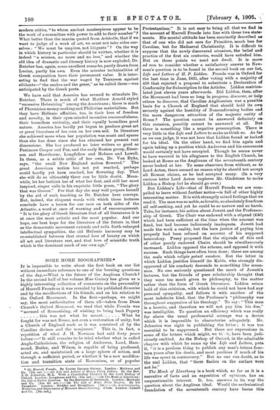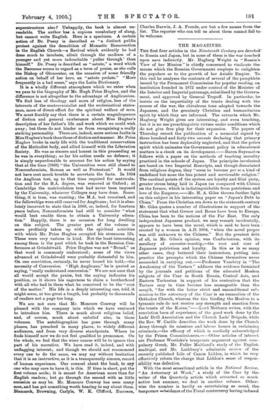IT is impossible to write about the first book on
our list without immediate reference to one of the burning questions of the day,—What is the future of the Anglican Church ? In the second half of her volume Miss Guiney has given us a highly interesting collection of comments on the personality of Hurrell Froude as it was revealed by his published Remains and by the recollections of his friends, and on his relation to the Oxford Movement. In the first—perhaps, we might say, the most authoritative of them all—taken from Dean Church's Oxford Movement, we read that while Froude was "accused of Romanisiug, of wishing to bring back Popery
this was not what he meant What he fought for was not Rome, not even a restoration of unity, but a Church of England such as it was conceived of by the Caroline divines and the nonjurors." This is, in fact, a repetition of what J. H. Newman had said forty years before :—" It still remains to be tried whether what is called Anglo-Catholicism. the religion of Andrewes, Laud, Ham- mond, Butler, and Wilson, is capable of being professed, acted on, and maintained on a large sphere of action, and through a sufficient period, or whether it be a new modifica- tion and transition state of Romanism, or of popular • (1) Rumen Proud*. By Louise Imogen Gainey. London Methuen and Co. Poe. net ]—(2) life and Letters of Henry Parry Liddon. By the Bev. J. 0. Johnston. M.A. With a Concluding Chapter by the Lord Bishop of Oxford. London : Longman, and Ca Rs. net.)—(3) The Monk of Llanthony the Life of Father Ignatius. By the Baroness de Bertouch. London : Methuen and Co. [10e. 6d. net.]—(4) The We of Hugh Price Hughes. By his Daughter. London : Hodder and Stoughton. 1149.]—(5) Autobiography, Memories, and Experiences OM:mews Danwl Conway. 2 vas. London : Cassell and Co. [30s. net.]
Protestantism." It is not easy to bring all that we find in the account of Hurrell Fronde into line with these twe state- ments. His mental attitude has been succinctly described as that of one who did not care for Primitive, much less for Caroline, but for Mediaeval Christianity. It is difficult to suppose that the newly discovered eirenicon, the belief and practice of the first six centuries, would have satisfied him. But on these points we need not dwell. It is more ad rem to consider whether a satisfactory answer to New- man's question is to be found in the second book on our list, Life and Letters of H. P. Liddon. Froude was in Oxford for the last time in June, 1835, after voting with a majority of 459 that rejected a proposal to substitute a Declaration of Conformity for Subscription to the Articles. Liddon matricu- lated just eleven years afterwards. Did Liddon, then, after the Movement had been so long in progress, discover, or help others to discover, that Caroline Anglicanism was a possible basis for a Church of England that should hold its own securely against the hostility of Nonconforming bodies and the more dangerous attraction of the majestic entity of Rome ? The question cannot be answered definitely on this occasion, possibly cannot be answered at all. But there is something like a negative presumption. There is very little in the Life and Letters to make us think so. As far as we can judge, it was not here that Liddon found or looked' for his ideal. On the other hand, we find him again and again taking up a position which Andrewes and his successors would certainly not have occupied. Though he seems never to have wavered in his allegiance to the English Church, be looked at Rome as the Anglicans of the seventeenth century never looked at her. To some observers from without, as to Lord Acton, there seemed no reason why he should not accept all Roman claims, as be had accepted many. (In a very curious letter Lord Acton implores Mr. Gladstone to make. Liddon a Bishop lest he should go over.) But Liddon's Life—that of Hurrell Froude we are com- pelled to leave without further notice—is full of other highly interesting matter. It is with strangely mixed feelings that we
read it. The man was so noble, so lovable, so absolutely free from all self-seeking, and yet he could be so narrow and so harsh.
Take, for instance, his action about Jowett and the Professor- ship of Greek. The Chair was endowed with a stipend (£40) which had been sufficient at the time when the amount was fixed, but had become ludicrously inadequate. Jowett had made the work a reality, but the bare justice of paying him properly had been refused on account of his supposed heterodoxy. Pusey proposed that the stipends of this and of other poorly endowed Chairs should be simultaneously increased. Liddon opposed the scheme, and opposed it with success. Such things have often been done; these are among the male which religio potuit suadere. But the letter in which Liddon justifies himself (to Keble, who strongly dis- approved of his conduct) descends to something like mean- ness. No one seriously questioned the merit of Jowett's lectures, but the friends of pure scholarship thought that they were too much given to philosophy, to the matter rather than the form of Greek literature. Liddon seizes hold of this criticism, with which he could not have had any personal sympathy, and follows it with another of the
most indefinite kind, that the Professor's "philosophy was throughout suggestive of his theology." To say : " This man is a heretic, and therefore we will not pay him his due," was intelligible. To question an efficiency which was really far above the usual professorial average was a device which it is impossible to characterise adequately. Mr. Johnston was right in publishing the letter ; it was too essential to be suppressed. But there are expressions in some of the letters which might, we have been judi- ciously omitted. As the Bishop of Oxford, in the admirable chapter with which he sums up the Life and Letters, puts it, " it is a perilous thing to publish any man's letters four- teen years after his death, and most perilous if much of his life was spent in controversy." But no one can doubt, as to the real Liddon, that " these flashes on the surface were not he."
The Monk of Llanthony is a book which, so far as it is a narrative of facts and an exposition of opinions, has an• unquestionable interest. It, too, answers in its way the question about the Anglican ideal. Would the ecclesiastical foundation of the seventeenth century have borne this superstructure also ? Unhappily, the book is almost un- readable. The author has a copious vocabulary of slang, but cannot write English. Here is a specimen. A certain action of Br. Pusey is described as " a distinct public protest against the demolition of Monastic Resurrection in the English Church—a Revival which evidently he had done much to incubate, albeit through the medium of a younger and yet more indomitable puller through' than himself." Dr. Pusey is described as " astute," a word which the Baroness seems to regard as a term of praise, as she calls the Bishop of Gloucester, on the occasion of some friendly action on behalf of her hero, an "astute prelate." "More frequently in a bad sense," says the Latin Dictionary.
It is a wholly different atmosphere which we enter when we pass to the biography of Mr. Hugh Price Hughes, and the difference is not altogether to the advantage of Anglicanism. We find less of theology and more of religion, less of the interests of the controversialist and the ecclesiastical states- man, more of direct effort for the spiritual welfare of men. We must frankly say that there is a certain magniloquence of diction and general exuberance about Miss Hughes's description of her father's life and work which we could wish away ; but these do not hinder us from recognising a really striking personality. There are, indeed, more serious faults in Miss Hughes's book than those of diction and manner. Mr. Price Hughes broke in early life with the traditional conservatism of the Methodist body, and allied himself with the Liberation Society. He was as sincere and honest in this proceeding as he was in everything; so far his action needs no defence; it is simply unpardonable to account for his action by saying that at the time (1868) "the Universities were still closed to Nonconformists, Roman as well as Protestant." It would not have cost much trouble to ascertain the facts. In 1854 the Anglican test, up to that time required for matricula- tion and for the B.A. degree, was removed at Oxford ; at Cambridge the matriculation test had never been imposed by the University, whatever Colleges may have done. Some- thing, it is true, was wanting; the M.A. test remained, and the fellowships were still reserved for Anglicans ; but it is abso- lutely incorrect to state that in 1868, or, indeed, for fourteen years before, Nonconformists had still to consider " what would best enable them to obtain a University educa- tion." Happily, there is no occasion for long dwelling on this subject. The greater part of the volume is more profitably taken up with the spiritual activities with which Mr. Price Hughes occupied his strenuous life. These were very various in kind. Not the least interesting among them is the part which he took in the Reunion Con- ferences at Grindelwald. Price Hughes was not "Broad," as that word is commonly understood; some of the views advanced at Grindelwald were probably distasteful to him. On one conviction, certainly, he never loosed his hold,—the necessity of Conversion. " High Anglicans," he is quoted as saying, "really understand conversion." We are not sure that all would accept the praise, but the saying indicates his position, as it shows his eagerness to claim a brotherhood with all who had in them what he conceived to be the " root of the matter." His life is a deeply interesting one, told, it might seem, at too great a length, but probably to thousands of readers not a page too long.
We are not sure that Mr. Moncure Conway will be pleased with the company into which we have ventured to introduce him. There is much about religious belief, and, of course, much about unbelief also, in these volumes. The autobiographist has gone through many phases, has preached in many places, to widely different audiences, and from very diverse standpoints. Where he finds himself now we do not feel qualified to pronounce. On the whole, we feel that the wiser course will be to ignore this part of his narrative. We have read it, indeed, and with unflagging interest; and though we should not recommend every one to do the same, we may say without hesitation that it is an instructive, as it is a transparently sincere, record of human experience. Our counsel about the book, to any one who may care to have it, is this. If time is short, put the first volume aside; it is meant for American more than for English readers ; but go through the second with as little omission as may be. Mr. Moncure Conway has seen many men, and has got something worth bearing to say about them. Bismarck, Browning, Carlyle, W. S. Clifford, Emerson,
THE MAGAZINES.











































 Previous page
Previous page